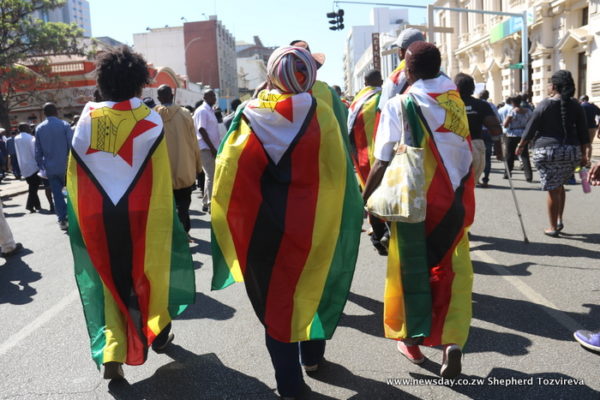
TOMORROW, the Sadc region in an extraordinary solidarity and for the second year running will be demanding that Western economic sanctions against Zimbabwe be unconditionally lifted.
Stir The Pot: Paidamoyo Muzulu
This is a huge statement and gesture from the region, but Zimbabweans remain split on the issue and are still worlds apart despite the economic and social havoc the sanctions have wrought on the country.
At the turn of the century, Zimbabwe embarked on revolutionary land reform programme — a programme that saw a massive seven million hectares expropriated from white commercial farmers for resettlement of landless blacks.
The land question was one of the unfulfilled agreements reached at the 1979 Lancaster House independence conference. The United Kingdom (UK) had undertaken to fund the land reform programme and was supported by the United States.
However, the Lancaster House agreement had sunset clauses — clauses that controlled how long the transfer of land should take and that whites for the first seven years of independence had reserved 20 seats in the National Assembly. Land was to be bought on a willing seller, willing buyer basis.
The process was slow and frustrating, enraging many who had fought in the armed liberation struggle who started accusing their leaders of selling out or getting closer to the former colonisers.
The Zimbabwean government acquired about three million hectares of land in the first decade of independence with financial support from the UK.
- Chamisa under fire over US$120K donation
- Mavhunga puts DeMbare into Chibuku quarterfinals
- Pension funds bet on Cabora Bassa oilfields
- Councils defy govt fire tender directive
Keep Reading
The restless peasants and veterans of the struggle in 1998 started invading white-owned commercial farms and resettling themselves. Seeing an opportunity to revive its waning popularity among the electorate, the Zanu PF administration endorsed the invasions which were chaotic and, in many instances, violent. Zimbabwe became headline news across the world, inviting the wrath of the UK and the US who immediately started imposing economic sanctions and travel restrictions, accusing the Zanu PF administration of violating citizens’ human, property and political rights.
Economic sanctions have been a punishment of choice for Americans against governments that upset the global economic structures. Cuba has suffered an economic embargo since 1960 solely because of its communism and nationalisation of land and industries after Fidel Castro assumed power through a war.
Iran, too, has suffered the same fate after its 1979 revolution. More recently, socialist administrations of Bolivia (Eva Morales), Venezuela (Hugo Chavez) and Greece (Alexis Tsipiraz) have faced the same fate.
Zimbabwe, in a rare diplomatic feat, has gained the support of Sadc and the African Union to have sanctions against the country condemned.
Members of Sadc and AU at the 2020 United Nations General Assembly called for the removal of sanctions against Zimbabwe. Among the countries that openly called for the lifting of sanctions were South Africa, Namibia and Kenya.
The sanctions against Zimbabwe, like South Africa’s African National Congress’s former leader Nelson Mandela listing as a terrorist, may take a while to be lifted considering they are a creature of the United States Congress.
Americans do not repeal their Acts in a hurry but often some laws become abrogated by disuse. It is common cause that the sanctions by the US have made the Zimbabwean economy squeal, with exchange rates swinging wildly and inflation spiralling out of control.
Some of the developments are in sync with the book An Economic Hitman, which chronicles how the US and the Bretton Woods Institutions are used to bring to heel countries that try to upset the global economic structures.
Despite solidarity from the region and continent, Zimbabweans still remain divided on the sanctions question.
The opposition, through its leaders at various international fora and on social media, have called on the US and the European Union to keep the sanctions in place.
They view the sanctions as a rod to discipline the Zanu PF administration and force it to implement political and economic reforms.
The main opposition, MDC Alliance, on Thursday boycotted President Emmerson Mnangagwa’s State of the Nation Address that was to mark the beginning of the Third Session of the Ninth Parliament.
Its leaders have also used social media to call their supporters to boycott any activities to do with the regionally-endorsed Anti-Sanctions Day.
Can the differences between the administration and the opposition be bridged? Yes, they can. Sanctions have not done Zimbabweans any favours over the last two decades.
Zanu PF has consolidated power, the economy is now comatose and the human rights situation is no better than in 2000. And for good measure, the opposition is still miles from assuming power.
Mnangagwa has to implement political and economic reforms not because the US and the EU wants them, but because it is good for Zimbabwe.
The security services — Zimbabwe Defence Forces — and the Central Intelligence Organisation have to be more professional and less partisan.
Actions of security services should not be above the law. They should be made answerable for their acts of impunity. Those implicated in the August 1 2018 fatal shooting of six unarmed civilians should have their day in court.
Publicly-owned media should be truly national and represent the diversity in this country and not be a mouthpiece of the ruling party — Zanu PF.
On the economic front, cartels and corrupt bureaucrats should be weeded out. The economy should be run in the interest of the majority and not the few.
And finally, the social contract as argued by Jean Jacques Rosseau should be respected — the rulers should rule with the consent of the ruled. This may not be asking too much from the administration. Sanctions should be lifted and let the poor breathe.











